Data centers that boast advanced environmental performance
At data centers owned and operated by NRI, we are promoting efforts to reduce our impact on the global environment by taking a dual approach of converting the electricity we use to renewable energy and reducing power consumption. NRI has established an environmental management system at all of its data centers in Japan and obtained ISO14001 international standard certification concerning its environmental management system.
NRI's "double-deck system" is the shape of data centers to come
With each passing year, the densification and performance of equipment installed at data centers to
handle the flow from sources such as virtualization and the transition to cloud computing are
increasing. This change has been accompanied by increased amounts of heat produced by the equipment,
and how to cool devices to ensure stable operation has become an ever greater challenge. On the
other hand, problems such as the increase in energy consumption resulting from excessive cooling are
also having an adverse effect on the environment.
The "double deck" system is a system that completely separates the floor where the server equipment
is placed and the floor where facilities-related equipment such as the air-conditioning and power
supplies are installed.
Separating heat-generating sources from the cooling system makes it possible to achieve highly
efficient and flexible air conditioning, and greatly reduce power consumption.
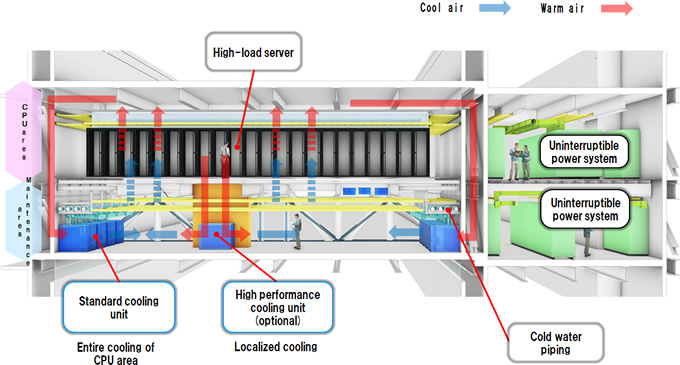
double-deck system
NRI is working to improve air-conditioning efficiency by combining task air-conditioning to provide zone cooling for high-temperature spaces with ambient air-conditioning, which cools an entire computer room to an average temperature.We're also striving to eliminate unnecessary power consumption by introducing motion sensors and lighting sensors in computer rooms and office spaces. In addition, we have introduced various energy-saving facilities, such as a “cold water vertical thermal storage tank” that stores cold water for efficient air conditioning.In addition to facility initiatives, on the operational side, we are working to optimize air conditioning settings using machine learning. Air conditioners, which were previously controlled individually, are now being optimized as a whole by utilizing air flow simulation data.
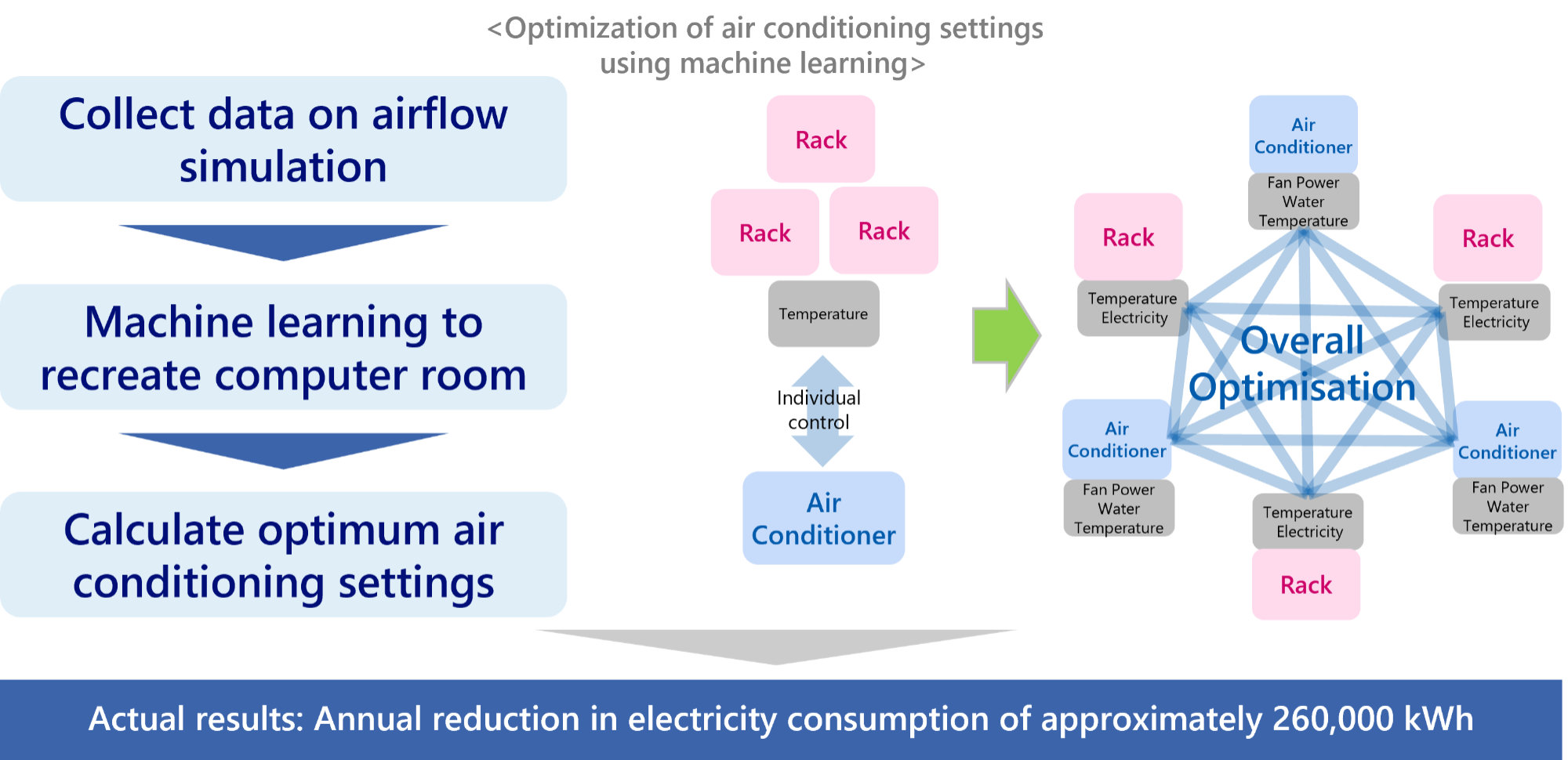
Use of natural energy
NRI has introduced free cooling or high-temperature chilled
water* to achieve a substantial reduction in power consumption for air-conditioning by using the low
external air temperatures during winter and mid-season operations to produce chilled water without
the use of refrigeration units.
NRI is also working to reduce its environmental impact to the maximum extent possible through the
use of natural energy, including solar power systems and geothermal heating systems.
*Water temperature of around 14 ~ 15℃. Electricity consumption can be kept in check more efficiently than with the cold water of around 7℃ that is normally used.
In addition to these efforts, we have achieved 100% utilization of renewable energy in our data centers in FY2023.
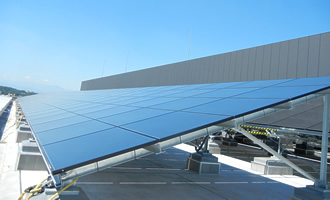
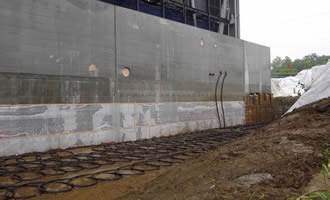
Maintenance of landscapes and coexistence of with neighborhood areas
We have sought to harmonize Tokyo Data Center I with the surrounding area by setting the entire building into sloping land to maintain the landscape and utilizing exterior wall greening and a rooftop gardening.
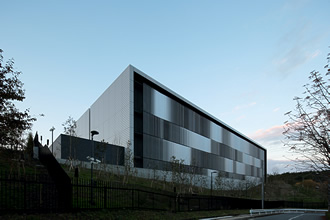
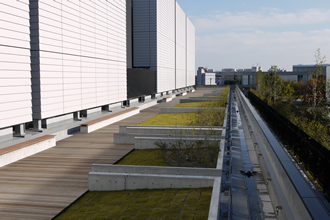
Tokyo Data Center I's Environmental Performance
The Tokyo Data Center I, which opened in November 2012, employs the aforementioned
“double deck system” and, by combining multiple energy-saving technologies
based on this system, has achieved a significant reduction in power consumption. In
recognition of its advanced environmental performance, the center received the Minister
of Economy, Trade and Industry Award at the Green IT Awards 2013.
The "Green IT Awards" are commendations for excellent products, technologies and
activities that contribute to the achievement of a low carbon society and are presented
by the Green IT Promotion Council in two categories for "savings in IT-related energy
consumption" and "energy conservation through the use of IT" as part of its efforts to
accelerate the Green IT Initiative.
In March 2023, the Tokyo Data Center I was certified as a top-level facility* for the Tokyo Metropolitan Government's Tokyo Cap-and-Trade Program.
- *
The Tokyo Cap-and-Trade Program of the Tokyo Metropolitan Government certifies business operators making outstanding efforts to tackle global warming as either top-level facilities or near-top-level facilities.
Tokyo Data Center I PUE*: 1.28 (design value), the highest level in the industry
- *
PUE (Power Usage Effectiveness) is an indicator to show how efficiently a data center uses energy; the value is calculated by dividing the total amount of energy used by a data center facility by the energy delivered to computing equipment.
The standard data center PUE is said to be about 2.0.
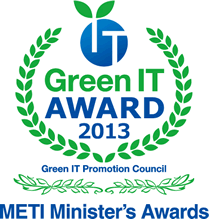
Energy conservation and environmental impact reduction activities in offices
The NRI has taken steps to optimize office air-conditioning temperatures and lighting levels and implemented power saving settings for office equipment, including PC displays and multifunctional devices. We also promote green procurement for office equipment to select highly energy efficient products.
In addition to our use of environmentally friendly products, the
NRI Group is also serious about re-using and recycling PCs and waste paper. We promote green
purchasing for our office supplies as well.
A preference for a paper-free working environment has also taken root at our meetings and informal
gatherings.